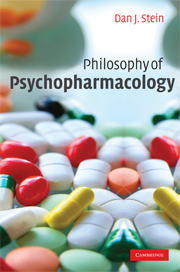Book contents
- Frontmatter
- Contents
- Preface
- 1 Psychopharmacology – a remarkable development
- 2 Philosophical questions raised by psychopharmacology
- 3 How to think about science, language, and medicine: classical, critical, and integrated perspectives
- 4 Conceptual questions about psychotropics
- 5 Explanatory questions about psychotropics
- 6 Moral questions about psychotropics
- 7 Conclusion
- References
- Index
6 - Moral questions about psychotropics
Published online by Cambridge University Press: 13 August 2009
- Frontmatter
- Contents
- Preface
- 1 Psychopharmacology – a remarkable development
- 2 Philosophical questions raised by psychopharmacology
- 3 How to think about science, language, and medicine: classical, critical, and integrated perspectives
- 4 Conceptual questions about psychotropics
- 5 Explanatory questions about psychotropics
- 6 Moral questions about psychotropics
- 7 Conclusion
- References
- Index
Summary
In this chapter we address a series of questions about ethical choices. The classical versus critical contrast drawn throughout this volume can perhaps also be applied to ethics. A classical approach would take the view that decisions about ethics in general and bioethics in particular can be made on the basis of moral laws. Thinkers from Plato to Kant have described the rationality of such universal and fixed rules, with more recent philosophers such as Rawls (1971) viewing moral theory as a kind of grammar. In contrast, a critical position emphasizes that such a view is unrealizable given that decisions about ethics and bioethics reflect the concerns and values of the particular historical and geographical contexts in which they are made. Hegel, for example, argued that a systems of laws loses its meaning when attempts are made to abstract it from its grounding in the ethical life of a particular historical community.
Here a realist, naturalist, and embodied position is taken, arguing that insofar as decisions about ethics and bioethics are informed by universal biologically based considerations, there exists the potential for minimal standards of agreement about ethics and about values, and it is possible to debate reasonably (cognitively–affectively) in order to ensure that good bioethics decisions are reached. Thus, for example, there is near-universal agreement that when physicians relieve pain this is a good thing, and it is also possible to argue reasonably for the importance of not relieving pain or suffering in particular contexts (Barris, 1990; De Botton, 2001; Johnson, 1993) or, conversely, that there has been under-medication of pain in certain circumstances.
- Type
- Chapter
- Information
- Philosophy of Psychopharmacology , pp. 99 - 130Publisher: Cambridge University PressPrint publication year: 2008



